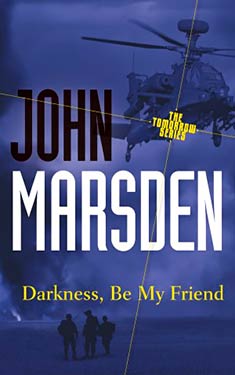Darkness, Be My Friend
| Author: | John Marsden |
| Publisher: |
Houghton Mifflin, 1999 Pan Macmillan, 1996 |
| Series: | Tomorrow: Book 4 |
|
1. Tomorrow, When the War Began |
|
| Book Type: | Novel |
| Genre: | Science-Fiction |
| Sub-Genre Tags: | Near-Future |
| Awards: | |
| Lists: | |
| Links: |
|
| Avg Member Rating: |
|
|
|
|
Synopsis

PEN America's Index of School Book Bans – 2023-2024 lists instances where students' access to books in school libraries and classrooms in the US was restricted or diminished, for either limited or indefinite periods of time. Some of these bans have since been rescinded and some remain in place.
Darkness is the friend and enemy of those who hunt by night.
Ellie and her friends have found safety after months of fighting. But the New Zealand Defence Force needs their help to infiltrate occupied Australian territory.
And so the friends must fight on.
Excerpt
I didn't want to go back.
That sounds pretty casual, doesn't it? Like saying, 'I don't want to go to the movie', 'I think I'll give that party the flick', 'I don't feel like it today'.
Just one of those comments you make.
But the truth is, I felt so sick at the thought of going back that my insides liquefied. I felt like my guts would pour out of me until my stomach caved in. I could even picture it: my ribs touching my backbone.
But my insides didn't pour out. After they told us what they wanted I'd go and sit on the dunny, but nothing happened. Sitting there holding myself, wondering if I'd ever feel good again.
And it was because my life was at stake. My life. I thought there should be a long time to think about that, a lot of careful thinking, a lot of discussion. Everyone giving their opinions, heaps of counselling and stuff, then me going away and spending weeks weighing up the options.
But it wasn't like that. They pretended there was a choice, but they were just, you know, doing it to make me feel good. And OK, maybe the truth is there couldn't be a choice, because the whole thing was too important. But I didn't want to know about that. I wanted to scream at them, 'Listen to me, will you! I don't care about your big plans, I just want to hide under the bed and wait until the war's over. All right? That's all I want. End of story.'
And I wanted someone, anyone, to acknowledge that I was being asked to put my life on the line. That what they wanted me to do was enormous, gigantic, ginormous.
Life, to be sure, is nothing much to lose;
7But young men think it is, and we were young.
That's from a poem a World War One guy wrote. A teacher in Dunedin gave it to me, and OK, I'm a young woman not a young man, but I still don't want to lose my life. I don't know much about anything but I do know that.
So, there I was, wanting weeks to think, to concentrate, to feel. To get used to the idea of going back. To get ready.
Wanting weeks and getting days. Five days to be exact. Five days between Colonel Finley asking us, and our arriving at the airfield.
If anything, I guess I felt angry. Cheated. They were treating me and my life like I was a plastic toy. Pick it up, play with it a moment, chuck it aside. Plenty more where that came from.
Colonel Finley always talked to us like we were soldiers under his command. Like there was no difference between us and his troops. But they had signed up to take risks and fight wars and shoot people. We hadn't! Seemed like only yesterday that we'd needed a lollipop lady before we could even cross the road outside school. And yes, I know, people have told me a thousand times how in some countries kids are in the army when they're eleven years old, but I didn't care about that.
'That's not how we do it,' I wanted to shout at them. 'We're different.'
That was all that mattered to me.
Only Fi seemed to understand how I felt. Up to a point, anyway. I couldn't help thinking that she didn't see it quite the way I did. That surprised me, I've got to admit. I didn't want to look like a wimp, compared to the others. I wanted to be stronger than everyone. Fi had her own strengths; I knew that, of course, but I liked to think that I was more of a leader than her. Yet here she was saying pretty well straightaway that she'd go, while I sat there in shock, dithering, wanting to go off for a few years and think about it.
I was actually angry at her, that was the crazy thing.
Or maybe not so crazy. After all, I was angry at everyone. Might as well include her.
It started when we'd been in New Zealand almost five months. We'd escaped from a nightmare, or we thought we had. The truth is, there's no escape from some nightmares. This one followed us across the Tasman. They'd air-lifted us out of our own country after it was invaded. We'd arrived in New Zealand burnt and injured and shocked, with broken bones, and scars inside and out. We'd lost contact with our families, we'd seen friends die, we'd caused other people to die by our own deliberate actions.
We were just typical survivors of war, I guess.
And then it all started again.
It was the end of spring, moving into summer. The bushfire season. And that's appropriate because the whole thing began a bit like a bushfire. You know how it is. First you hear warnings on the radio, then you hear a rustling in the distance, like bark in a breeze, then there's white smoke, could be clouds, maybe not, can't be sure but at last comes the smell, the never-could-be-mistaken smell of burning.
And suddenly it's on you. Suddenly there are trees exploding a hundred metres from the house and the heat's like you've opened an oven door and sat in front of it and there's the sound of roaring wind and in among the grey and white smoke you see the wild wicked flames dancing.
For us the first hint, the first warning, was a rumour going round the refugees that some of them would be dropped back into occupied areas. Either with Kiwi troops or, in some cases, on their own. Either to carry out a particular job, or to be guerillas, doing the sort of stuff we'd done around Wirrawee and Cobbler's Bay.
I must be dumb, because I didn't think they'd ask us. It never crossed my mind. Lee heard about it first. 'Bet we're on their shopping list,' he said. But I didn't take any notice: I think I was reading at the time. Emma, as I recall.
I've got to keep on trying to be honest here, because I have been, ever since I started writing stuff down, so I'd better say that the reason I thought they wouldn't ask us is that we'd done so much already. God, hadn't we done enough? Hadn't we gone for it, time and time again? Hadn't we blown up a ship and wrecked Cobbler's Bay and killed a general in Wirrawee? Hadn't we had Lee shot in the calf and the other three? (I can't even say their names right now.) And hadn't we stared death right in the face and felt its cold fingers tightening its grip on the backs of our necks? What would satisfy them? Did we all have to die before they'd say, 'OK, that'll do, you can have the rest of the war off.'?
How much did we have to do?
It gets me so upset thinking about it.
I know there's no logic in this. I know when there's a war on they can't just say, 'Look, we'll carry on with out you guys for a while, you give it a miss for a year or two.'
But somewhere along the line, somewhere way back in childhood, we'd been taught that life is actually fair, that you get out of it what you put in, that if you want something badly enough you can achieve it.
That's garbage. I know that now.
Suddenly at the time in my life when I most wanted things to be fair, suddenly no one was mentioning the word any more. It wasn't on our spelling list; there was no Pictionary card for it; the Macquarie went straight from 'faint' to 'fairy'.
The New Zealanders had been good to us before this, I've got to admit. Of course that made it even harder to refuse Colonel Finley. But yes, they'd been good to us. Right from the start they'd arranged a lot of counselling and stuff. We all ended up getting that, even Homer and Lee who once upon a time wouldn't have gone to a shrink if you'd paid them. The psychologist they gave me, Andrea, I got really close to her. She became like a second mum.
And we did actually have holidays and everything. I'm not kidding, we were like heroes.
Copyright © 1996 by John Marsden
Reviews
There are currently no reviews for this novel. Be the first to submit one! You must be logged in to submit a review in the BookTrackr section above.
Images
No alternate cover images currently exist for this novel.



















 Full Details
Full Details






